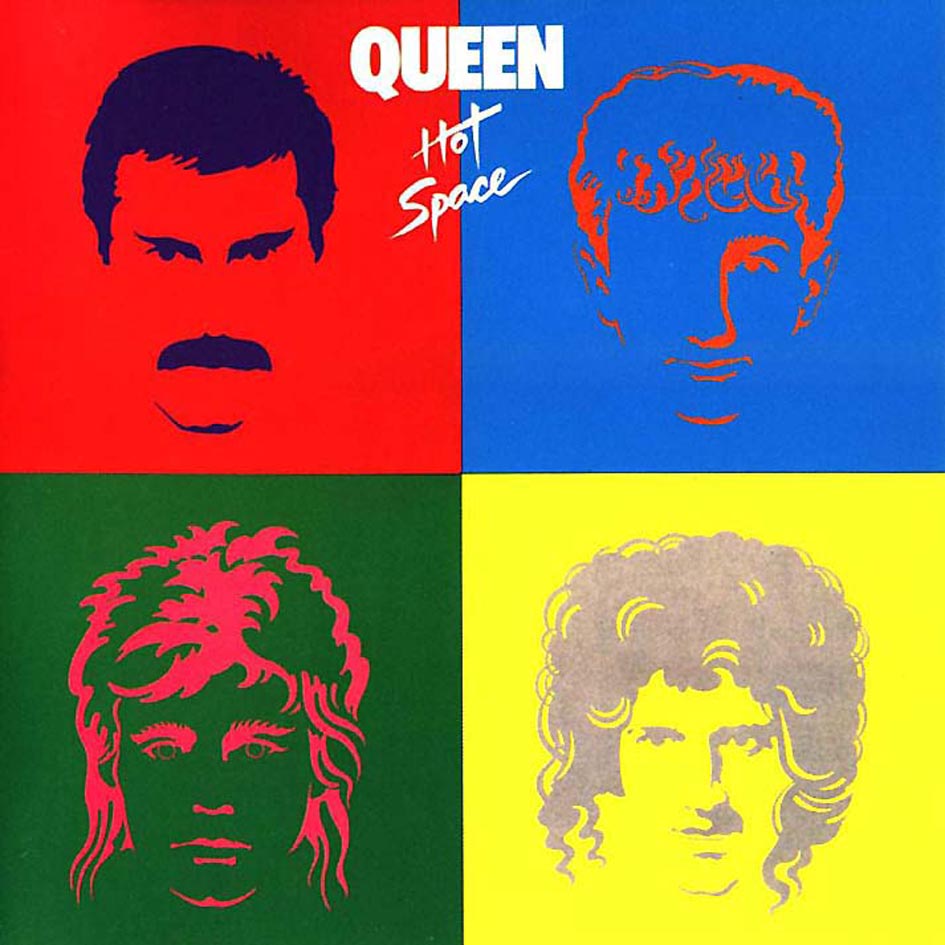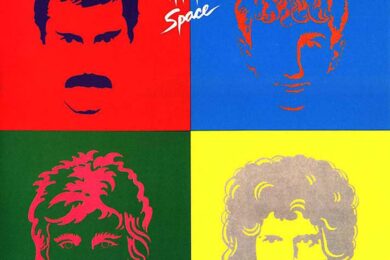The first two minutes of this grainy interview with Queen from 1984 is, in terms of their material, a devastating listen. Hearing them talk so resignedly about the one album in their considerable canon that saw them follow up on a whim, pursue a microbe of thought through to maturity, it’s no wonder that people thought Hot Space was a dud.
"We almost spent too much time on it…"
"A whole album of that isn’t really what people want from us…"
Taylor and May sound like they’d recorded the most depressing album of their career. John Deacon, arguably a driving force behind it thanks to his time hanging out in the studio with Chic, has little to say. But the worst comes from Freddie Mercury. Did the negative reaction to Hot Space affect their approach to the album that followed it, The Works? "It made us play a little bit safer." If there’s one thing you never, ever want to hear Freddie Mercury talking about, it’s playing safe.
And safe it certainly isn’t. Hot Space takes all the things that Queen were known for and either removes them or treats them to ridiculous subversions. So that means drum machines instead of booming tom-toms, ludicrous brass arrangements instead of opulent guitar histrionics and, more than ever before, an obsession with sex. You know, rather than ogres and dragons and flouncing about.
Experiments litter the choppy pace of the album, each an insightful clue as to what the hell they were thinking when they recorded it. By this point, remember, the band had already become a touring beast of legendarily debauched repute. Steaming pyrotechnics, dwarves covered in cold meats and an encyclopaedic appetite for drugs were the order of the day, and if little Deacy was going to start pissing about with disco songs then it was about time a huffy May and Taylor delivered some stadium bangers to keep the live show normal. May even recorded the guitar solo for ‘Put Out The Fire’ completely pissed and, by the sounds of it, in a total grump.
The conflict between this and the experimentation absolutely topple Hot Space into a different realm, sort-of like a middle ground between the kitchen (where Roger Taylor is dressed as a woman and flipping pancakes) and the bedroom (where Freddie Mercury is dressed as a woman and sitting next to the bed on an industrial tub of cooking oil). It’s uneasy, but beautifully entertaining.
‘Staying Power’, the album’s opening track, has a disgusting (in a good way) chorus of horns running all the way through it like a jalapeno stick of rock, arranged by Arif Mardin (who did the same for Chaka Khan among others). It’s just stupid, all high-register showing-off and sharp-tongued staccato. But somewhere inside all the bombast is a gruff roar from Freddie Mercury that, despite the song’s afro-funk energy, is as ‘rock’ as anything they recorded before. Mercury soars throughout the song and, indeed, the whole album, uninterested in how silly it might sound. Actually, ‘uninterested’ isn’t quite strong enough – ‘positively disengaged with any notion of musical propriety’ might be better.
‘Back Chat’, on the other hand, is a ruthlessly catchy and polite little exercise. John Deacon switches to guitar (Brian May appears to have wandered out of the studio at this point to stare at the sky) and so the histrionics are non-existent. This is Queen if they’d been born ten years later and had sampled The Average White Band. The idea of bands paring themselves down to their constituent parts is nothing new, but with a band quite so extrovert as Queen it’s wonderful to hear a huge struggle to contain themselves. Even Mercury’s bizarre enunciation of the final ‘t’ of ‘Back Chat’ speaks volumes about an imagined restraint, a cool attempt to be proper instead of gauche. And when Brian May finally does wander back in to do a guitar solo, it’s an angry, trebly squeal instead of the mentally harmonised, full-bodied fare we’re used to.
Queen’s famous ‘and no-one played the synthesiser’ disclaimers were, by now, a thing of the past. So it’s no surprise to hear synth bass lines all over ‘Body Language’ and the occasional boop-boops of a Deacon noise experiment on ‘Back Chat’. Similarly, let’s also not forget that Mercury’s lyrics were famous for being batshit at the best of times, and “Breastfeeding myself, I swallowed the bitter pill,” from ‘Life Is Real (Song For Lennon)’ is plenty to be getting on with. Tantalisingly, David Bowie recorded a rap section (or, more accurately, a mumble section) for the strangely louche funk-reggae number ‘Cool Cat’, but requested it be removed having thought better of it – fortunately it’s fairly available on YouTube and reissues. It’s not that bad.
And all this is before you’ve gotten anywhere near ‘Under Pressure’. Speaking of which, a discussion of Hot Space couldn’t really be complete without a mention of one of the greatest singles of the ’80s. And that’s it. There’s your mention. Despite its stature, it’s the least important song on the whole record, purely because everyone knows it already.
Most confusingly, the album has been labelled by band and fans alike a colossal disco mistake, a mulch of murky funk failures and half-songs. In fact, there are just as many bonehead rock songs and drippy ballads (from May and Taylor) as there are sleek dance numbers (from Mercury and Deacon). The wedge in the band between these two stylistic camps is the real reason for that divide in sound. Where the traditionalists opted for the safety of what went before, Mercury and cuddly John Deacon romped bollock-naked in a den of sexual imagery and leathery, sparse instrumentation.
All the subversions and confusions make Hot Space a contender for the most Queen-like Queen album – contrary, silly but delivered with absolute conviction. But even the band appeared to abandon it. Fans still debate on numerous Queen forums why Hot Space is, in their eyes, a total crud-flake. The arguments range from a desire to get played on ‘black’ radio stations to the supposedly dubious direction of Mercury’s personal manager, Paul Prenter, but weren’t these things always going on? ‘Another One Bites The Dust’ fluked them to the top of the charts a couple of years earlier and found them a new audience, so what was the problem with trying a few things out on the album that followed it? Divided, they fell.
Hot Space is an essential cog for Queen completists. If you’re going to love Queen, then you need to love Hot Space too, and everything that it entails. Or, at the very least, you need to learn to see the many positives. The trouble is, everyone thinks it’s an impossible album to love. Far be it from this piece to tell what you should or shouldn’t love, but it’s really not that tricky – Hot Space arranges all of Queen’s strongest whims and eccentricities, but they’ve become removed from a sympathetic context. Angry band members, stylistic confusion and tour fatigue combined with a manager who supposedly indulged Mercury’s every creative whim was never going to create a balanced work, but unlike other bands’ bad albums, Hot Space has invention and ideas to spare. So get hip, relax! Hot Space sounds nothing like Queen think it does.



